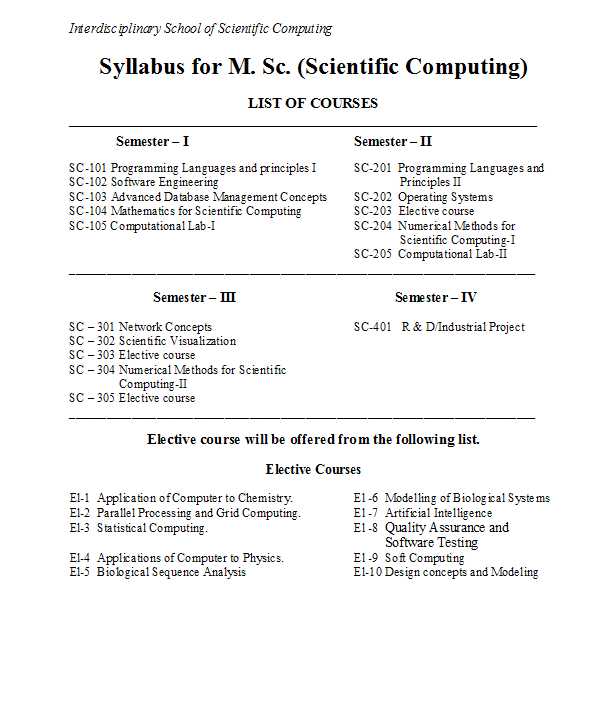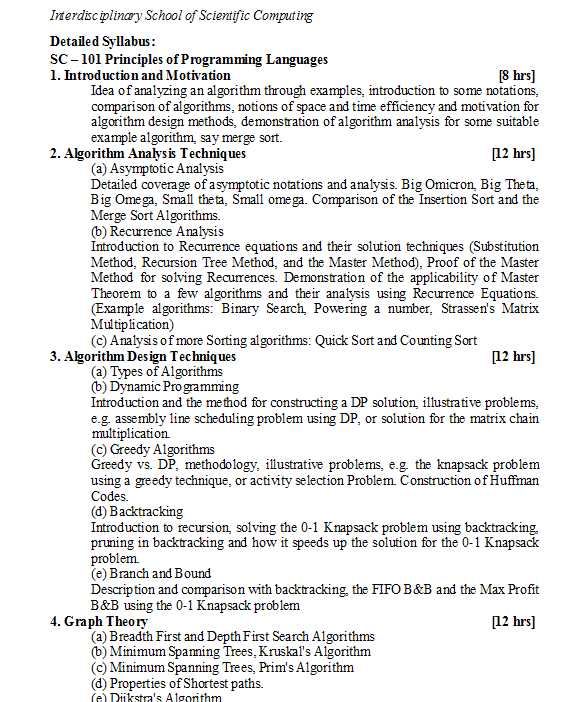|
#2
29th December 2016, 06:26 PM
| |||
| |||
| Re: Scientific Computing Pune University
As you asking for pune university. Sc. (Scientific Computing) course syllabus , so on your demand I am providing same for you : SC – 101 Principles of Programming Languages 1. Introduction and Motivation [8 hrs] Idea of analyzing an algorithm through examples, introduction to some notations, comparison of algorithms, notions of space and time efficiency and motivation for algorithm design methods, demonstration of algorithm analysis for some suitable example algorithm, say merge sort. 2. Algorithm Analysis Techniques [12 hrs] (a) Asymptotic Analysis Detailed coverage of asymptotic notations and analysis. Big Omicron, Big Theta, Big Omega, Small theta, Small omega. Comparison of the Insertion Sort and the Merge Sort Algorithms. (b) Recurrence Analysis Introduction to Recurrence equations and their solution techniques (Substitution Method, Recursion Tree Method, and the Master Method), Proof of the Master Method for solving Recurrences. Demonstration of the applicability of Master Theorem to a few algorithms and their analysis using Recurrence Equations. (Example algorithms: Binary Search, Powering a number, Strassen's Matrix Multiplication) (c) Analysis of more Sorting algorithms: Quick Sort and Counting Sort 3. Algorithm Design Techniques [12 hrs] (a) Types of Algorithms (b) Dynamic Programming Introduction and the method for constructing a DP solution, illustrative problems, e.g. assembly line scheduling problem using DP, or solution for the matrix chain multiplication. (c) Greedy Algorithms Greedy vs. DP, methodology, illustrative problems, e.g. the knapsack problem using a greedy technique, or activity selection Problem. Construction of Huffman Codes. (d) Backtracking Introduction to recursion, solving the 0-1 Knapsack problem using backtracking, pruning in backtracking and how it speeds up the solution for the 0-1 Knapsack problem. (e) Branch and Bound Description and comparison with backtracking, the FIFO B&B and the Max Profit B&B using the 0-1 Knapsack problem 4. Graph Theory [12 hrs] (a) Breadth First and Depth First Search Algorithms (b) Minimum Spanning Trees, Kruskal's Algorithm (c) Minimum Spanning Trees, Prim's Algorithm (d) Properties of Shortest paths. (e) Dijkstra's Algorithm (f) Bellman Ford Algorithm 5. NP-Completeness [12 hrs] (a) Polynomial time (b) Polynomial time verification (NP problems) (c) Concept of NP-Hard with example (Halting problem) (d) NP-Completeness and Reducibility (without proof) (e) Some NP-Complete problems (f) Overview of showing problems to be NP-Complete Pune University. Sc. (Scientific Computing) course syllabus   |